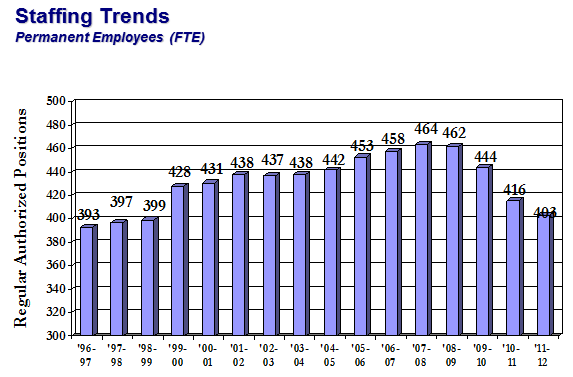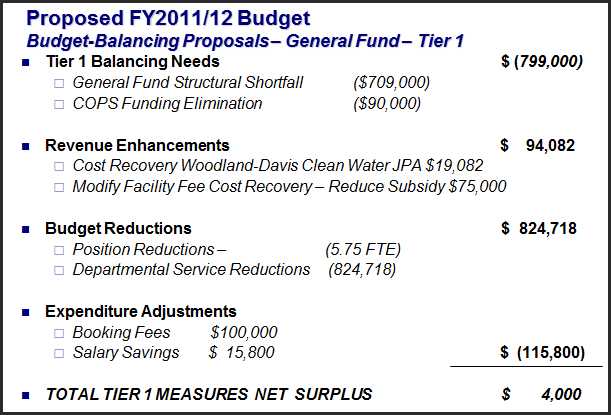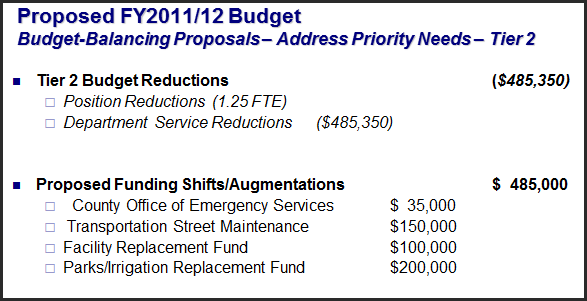 Budget Deals With Unfunded Needs For Roads and Infrastructure, but Not Pensions and Retirement Health Care –
Budget Deals With Unfunded Needs For Roads and Infrastructure, but Not Pensions and Retirement Health Care –
This was not strictly business as usual, as the city takes steps to move the budget towards the reality we face, even as I think it is still somewhat sugarcoating the numbers. Paul Navazio admitted that he had not pushed the numbers through to address fully the issues of unfunded liabilities in the pensions and retirement health.
“This represents the fourth consecutive year where budget reduction measures are necessitated in order to balance the City’s General Fund operating budget, as well as address further reductions in funding levels from state and federal sources supporting transportation and social services programs,” Interim City Manager Paul Navazio both wrote to council and said on Tuesday.
“As we enter the new fiscal year, the continued uncertainty over the general economy, as well as State and Federal budgets, suggest the need for contingency plans across selected areas of the City budget, specifically with respect to redevelopment, public safety and social service programs,” he continued.
He also acknowledged that cuts will become more and more difficult. However, he believes that making steep cuts this year will mean small surpluses in the future years. However, those assumptions are tenuous at best and may not reflect a full handling of the retirement issue.
“Our goal has been –and continues to be – to maintain fiscally sustainable city operations while minimizing impacts on direct services to the public,” he wrote and said on Tuesday. “However, our ability to accomplish this goal is challenged in the current economic environment despite the fact that the City, arguably, has not experienced the same level of recessionary impacts as seen in many other communities.”
The budget he ultimately recommends to the city council includes a total of $1.4 million in General Fund expenditure reductions with approximately $919,000 in savings needed to balance the General Fund operating budget.
“In addition, I am proposing an additional $485,000 in budget reductions in response to the City Council’s direction to provide increased funding in support of priority infrastructure maintenance and investment needs,” he again said and wrote.
This reflects the first time the city is addressing these needs in the five years that I have covered city council.
“While this budget attempts to minimize impacts on direct services to the community and strives to preserve – to the maximum extent possible – core and essential services, we cannot ignore the fact that cumulative staffing reductions over the past three years significantly impact the ability of the organization to continue to provide the array of high-quality service and responsiveness to our constituents,” Mr. Navazio continues.
On an all-funds basis this budget is drastically increased, but that is of course somewhat of an artifact of two factors. First, the capital program that invests in the new surface water project will pump huge amounts of money into the enterprise fund and that money comes directly from raised fees to ratepayers.
Second, the city has taken out bonds on redevelopment, which is adding millions to the all-funds budget.
But both of those items are not general fund expenditures and, indeed, the operating budget continues to decrease. The General Fund now will be 10% or $4 million less than it was just three years ago and eventually will drop by millions more.
The budget will rely on the need to cut regular positions again as it does not rely on one-time sources for ongoing operating costs.

As one can see, the staff trends are remarkable as the city now has its lowest level of staff since 1998-99. And per capita it has to go back much further than that.
The proposed budget balancing framework takes place in three tiers, though only the first two tiers will be implemented at the outset.
First, they address the general fund structural deficit. Second, they redirect additional funding in support of priority needs, including deferred maintenance and infrastructure investments through reprioritization of existing resources.
Third, they establish strategy to mitigate impacts in projected increases in employee benefit costs related to health insurance, retiree medical and pension benefits.
Fourth, they develop appropriate contingencies commensurate with the degree of uncertainty surrounding economic outlook, State and Federal budgets.
And finally they take steps to plan for scheduled renewal of the Parks Maintenance Tax, subject to voter-approval.
The last is one of the big questions – whether the voters at this point are inclined to renew taxes or, as Stephen Souza proposed, pay additional taxes.

The first tier of budget-balancing proposals deals directly with the structural shortfall of $709,000 and the loss of COPS (Community Oriented Policing Services) Funding that puts it at just over $800,000 in cuts.
This is where the city manager proposed the loss of police positions and a decrease in funding for the ombudsman. We will look at this in more detail later this week. However, my guess is this will not implemented, given the objection of Mayor Pro Tem Rochelle Swanson and the seeming support by others on the council.

The more radical proposal is the second tier of cuts, which aims squarely at transferring money from city services, including shutting down the Community Pool to street and facility maintenance funds.
I have long advocated that the city get serious about its roads and pump in general fund money, but closing down the pool figures to be quite controversial.
I will have more analysis and full commentary later in the week on this.
Council members gave limited remarks on Tuesday, as most of them were seeing these numbers for the first time.
As mentioned previously, Mayor Pro Tem Swanson is arguing the need to preserve the ombudsman and other police as an investment in the community. We need to look at cutting other areas in order to preserve public safety and infrastructure.
She also asked about the feasibility of looking at the budget in the multiyear term and she pushed for a real community workshop in advance of the budget.
This was an idea with much support on the council. They wanted to understand better the community priorities as council begins to cut away “bone,” as Councilmember Stephen Souza put it, having already cut away all of the flesh that they could cut.
He said that these reductions are already hurting now and they will hurt more in the future.
Given the cuts, he would like to see if the community is willing to look toward higher taxes so that we do not have to choose between programs to cut.
He argued we need to ask the community what we need, as we watch state and federal money disappear.
Sue Greenwald argued that this is the chickens coming how to roost. She also noted that this was the first time that they have seen this budget and that if we are to have a community discussion, we need to see this in advance.
She continued to press that the city needs to see a variety of scenarios for the budget under various labor agreements.
“I have the feeling that we could meet that one with the right combination,” she said referring to dealing with the unfunded retiree liability under a number of scenarios.
Councilmember Greenwald continued to argue that the budget understates the nature of the problem with unfunded liabilities. That is in part because it assumes flat compensation over the next five years, which does not seem realistic.
In addition to pushing for dealing with the unfunded retiree liability through a plan that would transfer money paid out in cafeteria payments, she also argued that we need to look at labor cost reductions before further cutbacks on services.
In particular, she said she was most uncomfortable about cutting back on the police. She noted the rise in crime that we see in the Davis Enterprise on a daily basis and does not want to see cutbacks to the police.
She noted that she was very upset about level of service reduction with the amenities – if we cut out the amenities, will people be willing to pay the taxes, she asked.
“I’d be surprised if we could focus on increasing taxes right now,” she said referring to Councilmember Souza’s tax increase proposal and then concluded. “I’m happy that the public is beginning to see the situation we’re facing.”
Councilmember Dan Wolk, in his first budget talks, called it “eye opening and sobering.”
He said that he hopes the public participates at the May 31 meeting, as he wants community input on how to prioritize services and cuts that the city has to make.
Mr. Wolk said that while he appreciates efforts to deal with unfunded liability in facilities, we need to pay equal or greater attention to unfunded liabilities in pensions and retiree. We need to establish strategy to address those.
He said he is not sure the budget gets into that as much as public infrastructure and facilities – and he wants to see more headway on that.
Mr. Navazio responded that there’s no denying the need to address the pension/ retiree medical over the long run. He acknowledged the council’s focus on that. However, he argued that conversation needs to initially take place with employee bargaining groups.
He said he found it difficult to recommend further reductions in services to the community to free up money to address those needs. He argued that we need to find alternatives to community services in order to address those liabilities. That is the reason we did not have a more aggressive effort to address unfunded liabilities in this budget.
While Joe Krovoza highlighted a number of positives, he was concerned with the unfunded liabilities issues. In particular he noted the amount of budget that is going to pay for retirement. That number has already increased from 3% just five years ago to 12% today and it is not done.
Paul Navazio acknowledged that number will climb to at least 19% of the general fund going to retirement.
And it is worse than that. Mayor Krovoza continues to believe the PERS (Public Employees’ Retirenment System) assumed rate of return will drop by one quarter to half a percent if not more.
Said Paul Navazio, “It turns into millions of dollars very quickly,” should that occur.
—David M. Greenwald reporting

I was actually pleasantly surprised to see city staff and the City Council actually start to grapple with the city’s very real budgetary problems. Under former City Manager Bill Emlen and the CC Gang of Three, this did not happen. Of course the economic situation is much more dire now, but there was a tendency previously to ignore the true fiscal situation of unfunded liabilities with the use of accounting tricks such as the “unmet needs” category to artificially “balance the budget”. This sort of thing has to end.
I will make the following observations about suggested budgetary cuts/solutions/issues:
1) It is not unreasonable to close Community Pool. My daughter worked as a City Pool Manager, and noted to me often that Community Pool was very underutilized. This is exactly the sort of cut in services that needs to be made, that would not seriously impact city services/citizens.
2) Cutting police at a time of rising crime rates makes no sense. We, as a city, have already become a target for the criminal element, as evidenced by what happened on Picnic Day and the Whole Earth Festival. If criminals get the feeling we will be an easier target bc of less of a police presence, crime in Davis will get even worse.
3) Joe Krovoza made an interesting suggestion about having some of the Fire Dept. become volunteers instead of paid employees. It certainly is an idea that should be explored. It is common for many fire departments to have volunteers instead of an all paid firefighter force.
4) Sue Greenwald has continually reminded us that the cafeteria cash-out system needs to end, and can be used to address the issue of unfunded liabilities with respect to medical coverage of city employees. Joe Krovoza also pointed out that the PERS projections may be too rosy – which seems pretty obvious. Sue Greenwald noted that no salary/step increases have been built into the budget assumptions, which is unrealistic. The city still is not grappling with the unfunded liabilities issue – no easy task to be sure.
5) The city will be lucky if it is able to extend the current parks tax. I very much doubt the city will be able to get an increase approved.
I agree with Elaine its good that the City is moving in the right direction…finally.
I blogged yesterday that the City of Stockton declared a fiscal emergency at their City Council last night–which will lead to cuts in labor contracts for police and fire which are 80% of Stockton;s general fund expenditures!
This quote from Sue leaps out at me:
[quote]She continued to press that the city needs to see a variety of scenarios for the budget under various labor agreements.[/quote]
I think laying our options is a very good idea. I like Joe’s idea of having a partially volunteer fire force; perhaps the volunteers will realize we could cut crew size. I also think an objective study of fire fighting needs is warranted.
A budget workshop is a good idea. However I can guarantee that the folks who show up will be largely special interests. The fire fighters union will be out in full force. So I hope the City Council does its homework and lays out options.
The public needs to know what is going on, but our Council also needs to show leadership. I suspect they know what the right thing to do is but need political cover.
All good points Dr. Wu!!!
[i]I suspect they know what the right thing to do is but need political cover. [/i]
What they *need* to do is hire someone well-versed and experienced in collective bargaining. Otherwise they run the risk of continuing to operate in a poisonous atmosphere of their own making. And I really don’t think much of negotiating terms and conditions in public. First, the uninformed opinions of ‘civilians’ carry no weight whatsoever, and only serves to harden positions otherwise flexible.
“First, the uninformed opinions of ‘civilians’ carry no weight whatsoever, and only serves to harden positions otherwise flexible.”
Yeah, those pesky civilians who foot the bill have no clue and don’t deserve to be heard.
Neutral:
I don’t disagree that too much can be done in public. There is a balance between what can be negotiated in private and public.
However the public needs to be made aware of the situation. And our labor negotiations over the past ten years are not a model that I wish to emulate.
That’s why I like the idea of a public workshop. However, I sometimes wonder how much interest there is. I was the only one to speak about this last night from the public. Few were there. More are there fore a whole variety of “lesser” issues. Two years ago we had a forum and maybe fifty people showed up, which is nice, but a very small number overall.
[i]those pesky civilians who foot the bill have no clue[/i]
For the most part, yes, including this and past Councils.
[i] and don’t deserve to be heard.[/i]
Being heard doesn’t mean negotiating in public.
[i]There is a balance between what can be negotiated in private and public.[/i]
Agreed.
[quote]What they *need* to do is hire someone well-versed and experienced in collective bargaining. Otherwise they run the risk of continuing to operate in a poisonous atmosphere of their own making. And I really don’t think much of negotiating terms and conditions in public. First, the uninformed opinions of ‘civilians’ carry no weight whatsoever, and only serves to harden positions otherwise flexible. [/quote]
I think this is a great idea. But why do we need to hire someone? Why not ask the members of the Davis Better Business Bureau take on the task.
“Cutting police at a time of rising crime rates makes no sense. “
I should probably point out that there is no evidence that I have seen that crime rates are actually rising in Davis or elsewhere.
[quote]I should probably point out that there is no evidence that I have seen that crime rates are actually rising in Davis or elsewhere.[/quote]
I would say what happened on Picnic Day and Whole Earth Festival is indicative of Davis not being as safe anymore. Just my opinion.
[quote]That’s why I like the idea of a public workshop. However, I sometimes wonder how much interest there is. I was the only one to speak about this last night from the public. Few were there. More are there fore a whole variety of “lesser” issues. Two years ago we had a forum and maybe fifty people showed up, which is nice, but a very small number overall.[/quote]
This is a real problem. The CC is looking for public input, but the public is noticeably absent. It is possible members of the public will make their views known via email/letter, as many do not care to speak in public. I hope so…
Elaine:
The crime rate is flat or even declining. I think there is a danger looking at news reports and visible events as they may distort the overall trend.
A former law enforcement officer once told me when your job is to investigate Cadillac Converter thefts, then you see them all day long and you will believe that the problem is a lot bigger and more important than it really is.
That’s why data is important because it is not sensitive to noteworthy events and looks at the overall trend. The trend is flat if not declining. Davis is more safe than most places in this country.
I agree with your second point. The council is looking for public input, not only is it absent, but many do not understand the pension problem we face.